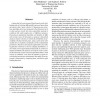Free Online Productivity Tools
i2Speak
i2Symbol
i2OCR
iTex2Img
iWeb2Print
iWeb2Shot
i2Type
iPdf2Split
iPdf2Merge
i2Bopomofo
i2Arabic
i2Style
i2Image
i2PDF
iLatex2Rtf
Sci2ools
105
click to vote
CSB
2004
IEEE
2004
IEEE
A Theoretical Analysis of Gene Selection
A great deal of recent research has focused on the challenging task of selecting differentially expressed genes from microarray data (`gene selection'). Numerous gene selection algorithms have been proposed in the literature, but it is often unclear exactly how these algorithms respond to conditions like small sample-sizes or differing variances. Choosing an appropriate algorithm can therefore be difficult in many cases. In this paper we propose a theoretical analysis of gene selection, in which the probability of successfully selecting relevant genes, using a given gene ranking function, is explicitly calculated in terms of population parameters. The theory developed is applicable to any ranking function which has a known sampling distribution, or one which can be approximated analytically. In contrast to empirical methods, the analysis can easily be used to examine the behaviour of gene selection algorithms under a wide variety of conditions, even when the numbers of genes invo...
Related Content
| Added | 20 Aug 2010 |
| Updated | 20 Aug 2010 |
| Type | Conference |
| Year | 2004 |
| Where | CSB |
| Authors | Sach Mukherjee, Stephen J. Roberts |
Comments (0)

